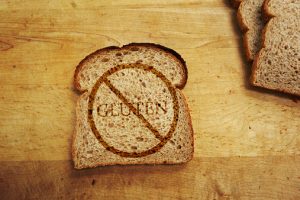 A gluten-free diet is known to aid in celiac disease, but it may also be able to improve your psoriasis as well. Many psoriasis patients have opted to go gluten-free and have found relief for their psoriasis even though there is little scientific evidence to support this practice. But as more and more psoriasis patients go gluten-free, science is taking a closer look at this trend.
A gluten-free diet is known to aid in celiac disease, but it may also be able to improve your psoriasis as well. Many psoriasis patients have opted to go gluten-free and have found relief for their psoriasis even though there is little scientific evidence to support this practice. But as more and more psoriasis patients go gluten-free, science is taking a closer look at this trend.
In preliminary studies, researchers examined if psoriasis patients were more likely to have gliadin antibodies. Gliadin is a wheat protein that people who are sensitive to gluten can’t ingest. Some studies revealed psoriasis patients do carry such antibodies, while others did not.
Advertisement
The most notable study on gluten and psoriasis was conducted based on the Nurses’ Health Study, involving questionnaires completed by over 82,000 nurses. The study found that women who drank beers five times a week were more likely to develop psoriasis compared to those who didn’t. You may not think beer has anything to do with gluten, but it contains barley, which triggers gluten sensitivities.
Dr. Jerry Bagel from the National Psoriasis Foundation believes that at least 25 percent of psoriasis patients would benefit from a gluten-free diet, but the Foundation as a whole is still indecisive about recommending a gluten-free diet to psoriasis patients.
Dr. Bagel also pointed out that patients with psoriasis affecting over 30 percent of the body seem to experience greater benefits going gluten-free than those with mild psoriasis.
Pros and cons of going gluten-free with psoriasis
As you can see, research into the association between gluten-free diet and psoriasis renders mixed results. Here are some pros and cons of going gluten-free with psoriasis.
- Going gluten-free has potential to relieve symptoms: You won’t know if you’ll benefit from going gluten-free unless you try (and there isn’t much a harm in trying). As mentioned earlier, many patients have noticed a reduction in their symptoms while following a gluten-free diet so it may be worth the try.
- You’ll eat healthier: Food items with gluten often tend to be unhealthier options, so you will find you’re eating healthier once you start eliminating gluten.
- You’ll likely notice an energy boost: Patients note that eliminating gluten has increased their energy levels because they no longer are plagued by digestive issues.
- Gluten-free diet is difficult to follow: Beginning a gluten-free diet can be difficult as you will always have to read labels carefully. Eating out may pose a challenge as well.
- You can’t cheat: Don’t think that slipping in a meal with gluten is okay – it’s not. The moment you consume gluten you will begin feeling horrible once again (if you are sensitive to gluten).
- Gluten-free foods may contain empty calories and more sugar: Just because it is labeled gluten-free doesn’t necessarily make it healthier. Once again, carefully read food labels to ensure you’re not consuming unnecessary sugar or empty calories.
- Shopping time will increase: Now that you’re focusing on gluten-free items, you’ll find you’re spending more time in grocery stores – you may have to do some homework to cut down on your time!
- You can’t drink beer: Although gluten-free beers are becoming more popular now, as a general rule, you should steer clear of this beverage.
Whether you have celiac disease or psoriasis, going gluten-free can be beneficial albeit difficult. It may seem hard at first, but over time it does get easier. And the fact that you’ll be feeling better is enough motivation to keep you going.
